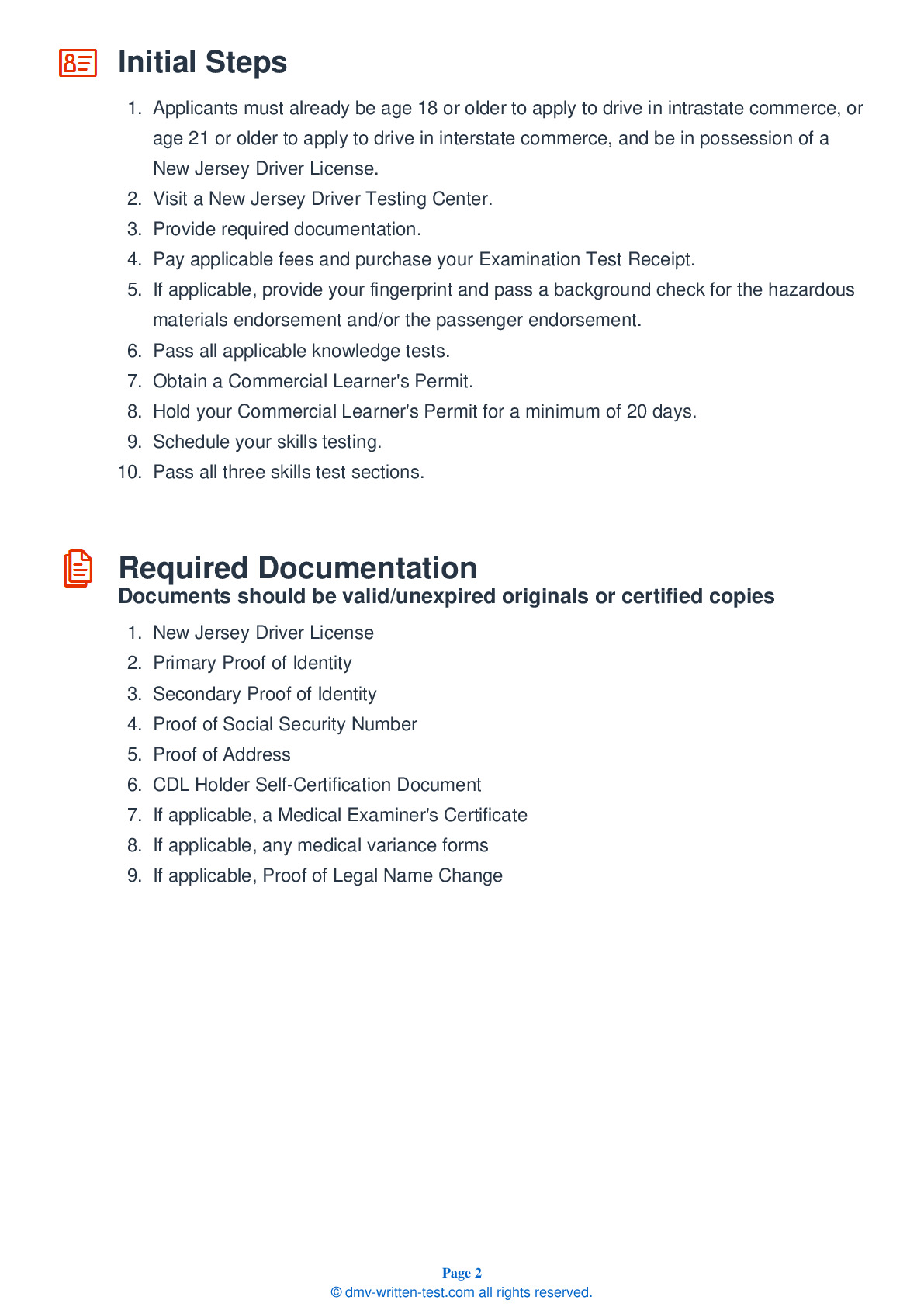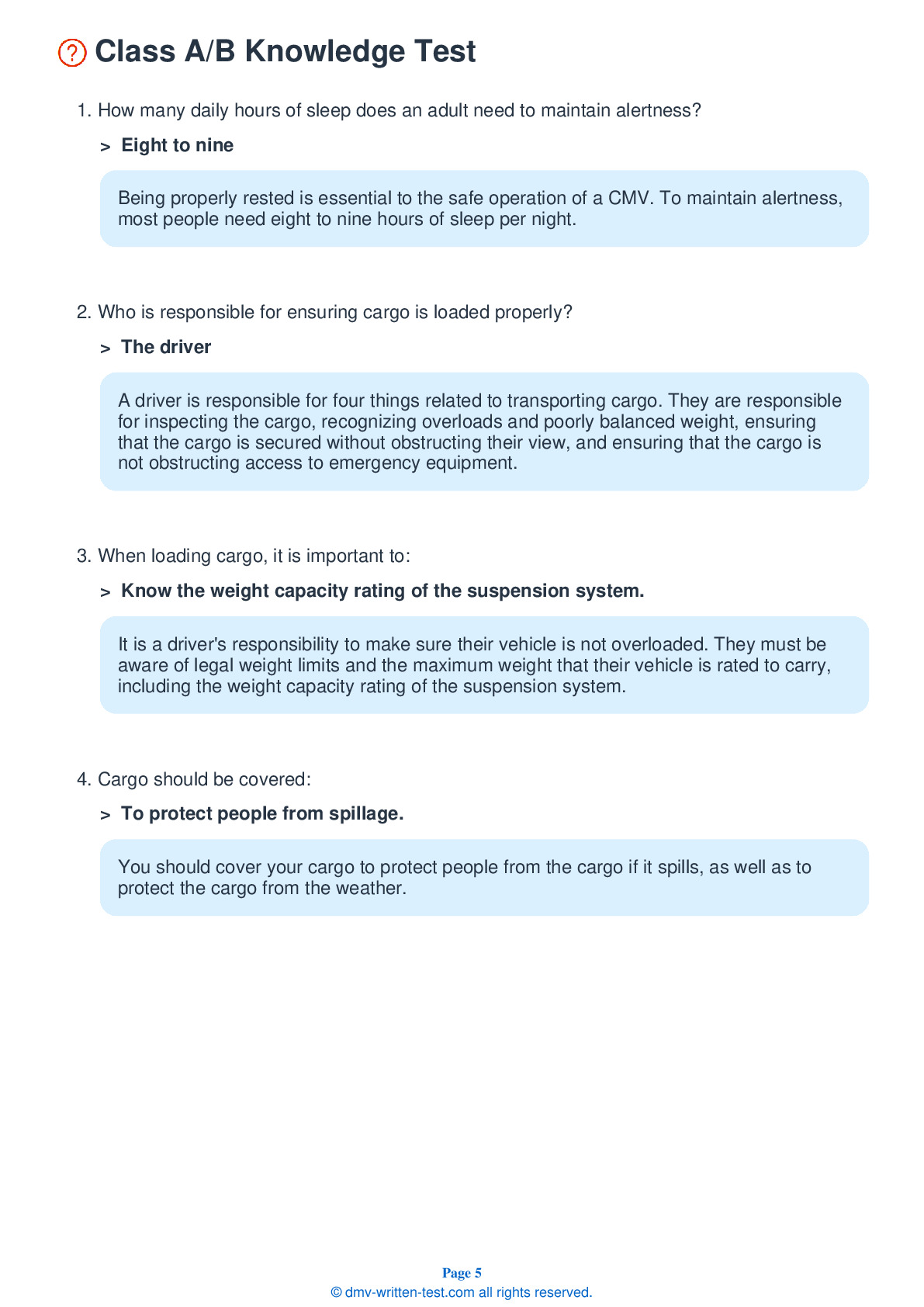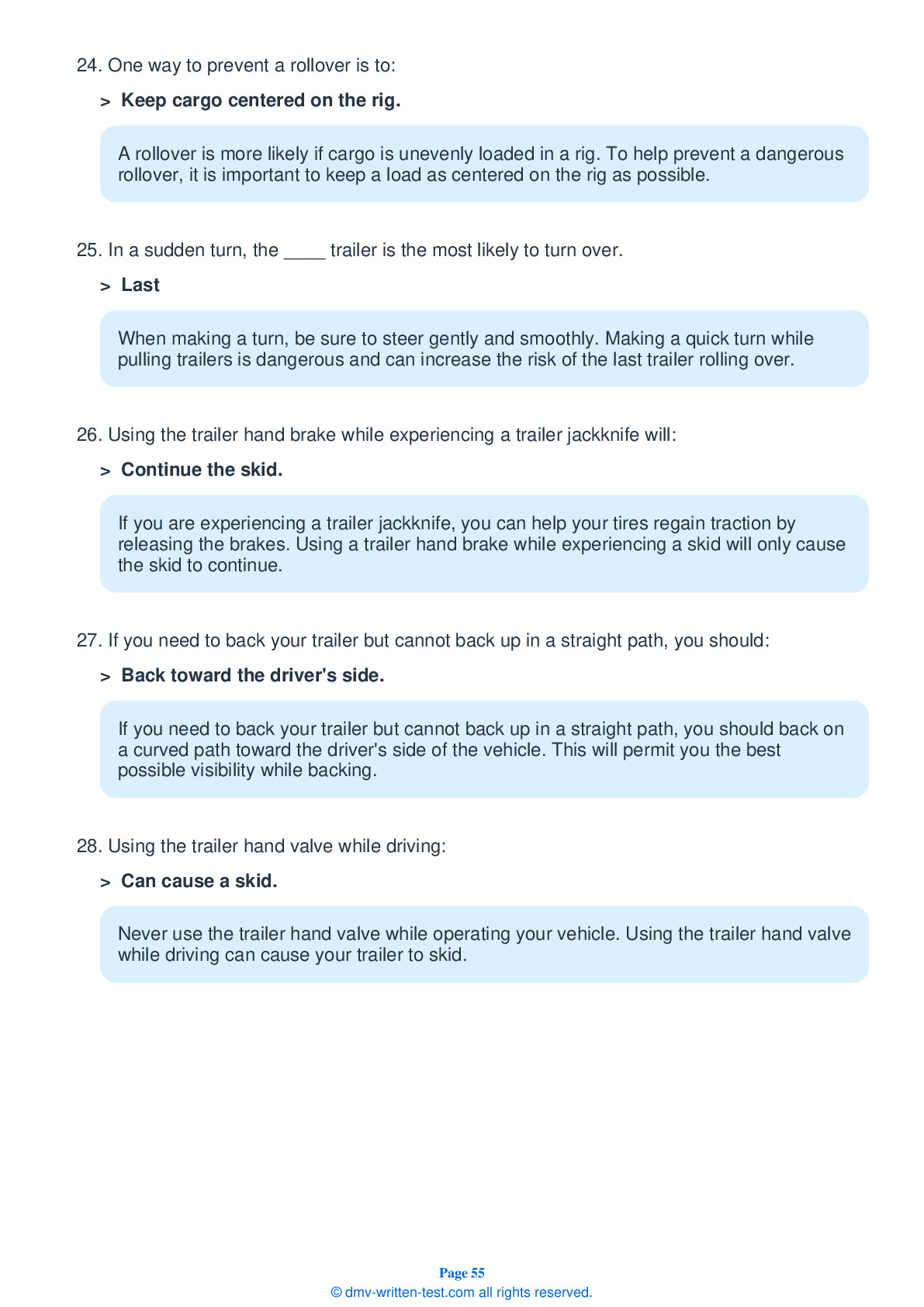Knowledge Test Class B
This license is required for driving a single vehicle with a GVWR of more than 26,001 pounds, and a trailer not to exceed 10,000 pounds gross vehicle weight rating, or a vehicle designed to transport 24 or more people (including the driver). To receive this license, applicants must pass a 50-question test. To pass, applicants must answer 40 questions correctly. Each question has four possible answer choices. Test questions come from the New Jersey Commercial Driver License Manual. Questions come from chapters covering: Introduction, Driving Safely, Transporting Cargo Safely, Air Brakes (if applicable), Pre-Trip Vehicle Inspection Test, Basic Vehicle Control Skills Test and On-Road Driving.. Endorsements that may be used with a Class B CDL are: Hazardous materials, Tank, Passenger, HazMat and Tank, Air Brakes and School bus.
36. You should always be able to stop within:
You should always make sure that your vehicle will be able to stop within the area of the road that you are able to see. This means that you must slow down whenever conditions reduce visibility.
37. A cardboard box on the roadway:
Any foreign object on the road is potentially dangerous. For example, something seemingly harmless, such as a cardboard box or paper sack, could contain a hard or heavy object that could do serious damage to a vehicle.
38. If you are not sure if there is enough space for your vehicle to safely pass under a bridge, you should:
If you are not sure that you have enough room to safely fit underneath a bridge or other overhead object, you should slow down and seek an alternate route, if possible.
39. Which of the following is not a sign of fatigue?
Driving while fatigued is dangerous. Warning signs of fatigue include difficulty focusing; repeated yawning or rubbing of the eyes; daydreaming or wandering thoughts; and drifting out of your lane.
40. Before driving a vehicle with air brakes, you should ensure that the spring brakes come on automatically when:
Before driving a vehicle with air brakes, you should ensure that the spring brakes come on automatically when air tank pressure falls to a level between 20 and 45 psi. You can do this by chocking the wheels and releasing air from the braking system by stepping on and off the brake pedal. Once the pressure drops to an unsafe level, the parking brake valve should pop out and spring brakes should come on.
41. If convicted of a traffic violation, you must inform your employer ____ of the violation.
If you are convicted of any traffic violations while driving any vehicle, you must notify your employer within 30 days of the conviction. This rule excludes parking violations.
42. Dry bulk tanks require special care because:
Driving with a dry bulk tank requires special care, both because dry bulk tanks have high centers of gravity and because their loads often shift in transit. Be especially careful when taking turns and curves while operating such a vehicle.
Frequently Asked Questions
Here are the steps to obtain a Class B CDL license in New Jersey:
1. Obtain a commercial learner's permit (CLP) by passing the written knowledge test for Class B vehicles at a New Jersey Motor Vehicle Commission (MVC) office. You must be at least 18 years old to obtain a CLP.
2. Hold your CLP for at least 14 days before taking the road test.
3. Schedule and pass the road test for Class B vehicles at an MVC office. The road test consists of a pre-trip inspection, basic vehicle control skills, and an on-road driving test.
4. Submit the necessary documentation and pay the fee to upgrade your CLP to a Class B CDL at an MVC office.
It is important to note that additional endorsements may be required depending on the type of vehicle you plan to operate. For example, if you plan to operate a vehicle carrying hazardous materials, you will need to obtain a Hazardous Materials (H) endorsement in addition to your Class B CDL license.
Here are some examples of vehicles that you can operate with a Class B CDL license:
1. Straight trucks
2. Dump trucks
3. Box trucks
4. Delivery trucks
5. Large buses (such as school buses)
6. Tow trucks (with certain weight limitations)
It’s important to note that if you plan to operate a vehicle carrying hazardous materials, you will need to obtain a Hazardous Materials (H) endorsement in addition to your Class B CDL license. Additionally, if you want to drive passengers for hire (such as on a bus), you may need to obtain a Passenger (P) endorsement.
1. Be at least 18 years of age to drive within the state of New Jersey, and at least 21 years of age for interstate driving.
2. Hold a valid New Jersey driver's license.
3. Provide proof of your identity and residency in New Jersey.
4. Pass a Department of Transportation (DOT) medical examination and obtain a medical certificate.
5. Obtain a commercial learner's permit (CLP) by passing the written knowledge test for Class B vehicles at a New Jersey Motor Vehicle Commission (MVC) office.
6. Hold your CLP for at least 14 days before taking the road test.
7. Schedule and pass the road test for Class B vehicles at an MVC office. The road test consists of a pre-trip inspection, basic vehicle control skills, and an on-road driving test.
8. Submit the necessary documentation and pay the fee to upgrade your CLP to a Class B CDL at an MVC office.
It is also important to note that you may be required to provide additional documentation or pass additional tests depending on the type of vehicle you plan to operate or any endorsements you may need to obtain.
It is important to note that even if you are 18 years of age or older and have a Class B CDL, you may still be subject to certain restrictions on the type of vehicles you can operate or the routes you can take, depending on your driving experience and endorsements.
The following are the types of endorsements that may be required for a Class B CDL license in New Jersey:
1. Passenger (P) endorsement: Required to operate a vehicle designed to transport 16 or more passengers, including the driver.
2. School Bus (S) endorsement: Required to operate a school bus.
3. Tank (N) endorsement: Required to operate a vehicle that is used to transport liquids or gases in bulk containers with a total capacity of 1,000 gallons or more.
4. Hazardous Materials (H) endorsement: Required to transport hazardous materials, as defined by the FMCSA.
To obtain any of these endorsements, you must pass additional knowledge and skills tests beyond those required for your Class B CDL license. Additionally, some endorsements may require background checks or other additional steps before they can be added to your CDL license.
1. Pre-trip inspection: The pre-trip inspection test assesses your ability to inspect your vehicle to ensure that it is safe for operation. You will be asked to demonstrate a thorough knowledge of the vehicle's components, such as the engine, brakes, steering, lights, and tires.
2. Basic vehicle control: The basic vehicle control test assesses your ability to control your vehicle in a controlled, off-street setting. You will be asked to perform maneuvers such as straight-line backing, offset backing, parallel parking, and alley docking.
3. On-road driving: The on-road driving test assesses your ability to safely operate your vehicle on public roads and highways. You will be asked to drive through various traffic situations such as intersections, turns, lane changes, and railroad crossings.
During the skills test, you will be evaluated on your ability to safely and efficiently operate a commercial vehicle. To pass the test, you must demonstrate good driving habits and meet or exceed the minimum requirements for each section of the test.
The following are some common restrictions or limitations for Class B CDL drivers:
1. Passenger restrictions: If you have a Class B CDL license with a passenger endorsement (P), you may be limited in the number of passengers you can transport and the type of vehicle you can operate.
2. Air Brake restrictions: If you took your skills test in a vehicle without air brakes, your CDL license will be restricted to vehicles without air brakes. If you want to remove this restriction, you will need to retake the skills test in a vehicle with air brakes.
3. Tank vehicle restrictions: If you have a Class B CDL license with a tank endorsement (N), you may be limited to operating vehicles that transport liquids or gases in bulk containers with a total capacity of less than 1,000 gallons.
4. Hazardous materials restrictions: If you have a Class B CDL license with a hazardous materials endorsement (H), there may be additional restrictions on the types of hazardous materials you can transport and the routes you can take.
It is important to understand and comply with all restrictions and limitations associated with your Class B CDL license to ensure that you are operating your vehicle safely and legally.
To take the test in a language other than English, you will need to request a foreign language interpreter or a translated version of the test. The request must be made at the time you schedule your test appointment with the MVC.
It is important to note that even if you take the written test in a language other than English, you will still need to demonstrate your ability to communicate in English during the pre-trip inspection and on-road driving portions of the CDL skills test.
If you have any questions or concerns about taking the Class B CDL written test in a language other than English, you can contact the New Jersey MVC for more information and assistance.
To request accommodations, you will need to fill out a Request for Accommodation of Individuals with Disabilities form, which is available on the MVC website or at any MVC office. You will need to provide documentation of your disability and the specific accommodations you are requesting.
The MVC will review your request and determine if the requested accommodations are reasonable and appropriate. Some examples of accommodations that may be provided include extended testing time, a private testing room, or a sign language interpreter.
It is important to note that you must make your request for accommodations at least 30 days before your scheduled test date to allow adequate time for the MVC to review and process your request.
If you have any questions or concerns about requesting accommodations for the Class B CDL written test, you can contact the New Jersey MVC for more information and assistance.
According to the New Jersey Motor Vehicle Commission (MVC), you must wait at least 7 days before retaking the CDL written test. If you fail the test a second time, you must wait at least 14 days before retaking it again. If you fail the test a third time, you must wait at least 21 days before retaking it.
It's important to note that there may be additional fees associated with retaking the CDL written test. You should contact the MVC for information on any applicable fees.
To prepare for your next attempt at the CDL written test, you may want to study the New Jersey Commercial Driver License Manual, which is available on the MVC website or at any MVC office. You can also consider taking a CDL practice test to help identify areas where you need additional study and practice.
If you have any questions or concerns about retaking the Class B CDL written test in New Jersey, you can contact the MVC for more information and assistance.




